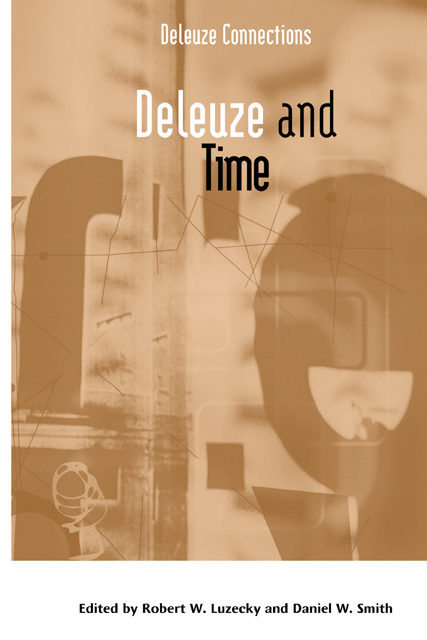7 - Disjoint and Multiply: Deleuze and Negri on Time
Published online by Cambridge University Press: 13 April 2023
Summary
The joint, cardo, is what ensures the subordination of time to those properly cardinal points through which pass the periodic movements which it measures … By contrast, time out of joint means demented time or time outside the curve which gave it a god, liberated from its overly simple circular figure, freed from the events which made up its content, its relation to movement overturned; in short, time presenting itself as an empty and pure form. Time itself unfolds … instead of things unfolding within it … It ceases to be cardinal and becomes ordinal, a pure order of time. (Deleuze 1994: 88; emphasis added)
Preamble
In the spirit of Gilles Deleuze and Félix Guattari’s collaboration, or deindividuated authorial coupling ‘between you and me’, we speak together (or not at all) as a fused reader-writer becoming-couple; a reader reading written signs of some writer(s) is the minimal threshold or condition.
In the imperative mode: disjoint, multiply, time or times, that is. An imperative, however, of exhortation, not command. We speak together, for the displacement and disjointing of unitary imposed time, that is, work time.
Presuming for now, at least at the limit (and the limit is, as we shall see below, the measure of the gradient or scissor angle between formal and real subsumption), more and more, all time is work time, as if all digital clocks had hidden punches. Work time is the marching time of ‘one-two-three-four-one-two-three-four’: regular, automatic, endlessly repetitive, instituting fast grooves to follow-fill. So on and so on and so on and so on.
Dis-joint, de-couple, dis-place. Favour, instead, multiplication. Love multiplies. Add and add and then take adding to the next power. Increase and fold over the increases to increase faster and at different scales. Release the folds of plural times, bloom a hundred flowers, explicate a thousand plateaus or levels.
Practice over theory, action over representation, knowing full well that as we use the technology or machine of language, the name of the thing tends to insist it is done and finished, pushing any dynamic tendencies, flows and fluxes of time to the margins, peripheries, and dumping lots of error.
As if time does not infect all things. As if names as fixed identities do not always fail.
- Type
- Chapter
- Information
- Deleuze and Time , pp. 136 - 158Publisher: Edinburgh University PressFirst published in: 2023



